Editor’s note: At the age of 97, Khushwant Singh, a long time agnostic, brought out The Free Thinker’s Prayer Book. It was an eclectic cocktail of quotes from various sources, religious and secular. The following excerpt is from Singh’s introduction to The Free Thinker’s Prayer Book. I am a very old man. And there is one eternal truth I can tell you right away: Old age is not pleasant; it buggers up your life. I am not yet senile, but my memory, of which I was very proud, is failing. Though I can still read, my hands shake so much that it is difficult to write anything legible. I have been spared the indignity of shitting in bed pans and having nurses wipe my bottom, but I often need assistance to get to the toilet. I am on more pills than I can count. In short, my body is giving up. It is time to say alvida and depart. I am reminded of these lines by John Keats: Now more than ever seems it rich to die, To cease upon the midnight with no pain . . . In the Mahabharata it is written, ‘Man grows old, but not desire.’ That great show-off, Oscar Wilde, said it more dramatically: ‘The tragedy of old age is not that one is old, but that one is young.’ They are both right. This is another reason why advanced age is a nuisance. The heart desires all the things you did in your youth, but time slowly robs you of the means to get them. [caption id=“attachment_1443121” align=“alignleft” width=“380”]  Reuters[/caption] But I should not complain. I have lived a reasonably contented life, and it will be easy to go. Sometimes, however, I wish I knew where to. I am not a man of faith. Since I do not believe in paradise or the possibility of rebirth, I have no idea where I will be after I die. It is like staring into an endless dark void. … For many years I dreaded death. To cure myself of the phobia, I would go to the cremation ground at Delhi’s Nigambodh Ghat and watch corpses burn to ashes and bone. It was cathartic. It cleansed me of petty vanities and anxieties and I returned home at peace with myself. But it did not help me overcome my fear. Now, I am no longer afraid of dying—in fact, the end will be welcome, as long as it is swift and painless. I have made my peace with the great void. …People who have religion seem to derive comfort from the belief that they will meet their Maker after they die, or that they will be reborn in some form. The more self-righteous among them are convinced that they will ascend straight to heaven. As an agnostic, I have no such comfort. So be it. I have no regrets. …The most endearing attempt to make a believer of me was made by a little girl some twenty-five years ago. I had written an article in The Indian Express spelling out my views on God and religion. Soon after, I received a letter from Supriya, the twelve-year-old daughter of the then editor of the paper, Rajmohan Gandhi. ‘Dear Uncle,’ she wrote, ‘I read your article in Daddy’s paper. So you don’t believe in God? You are wrong! Let me tell you, God exists. He visits our garden every day. He talks to my Mummy and my Daddy. He also talks to me and my little brother. So there!’ I was charmed and wrote back: ‘Dear Supriya, I am glad to hear that God visits your garden every day. And that He talks to your Mummy, Daddy, you and your brother. But He does not talk to me. Please send me His telephone number.’ Supriya did not reply. Three years later I met her parents in Delhi. They told me ruefully, ‘Supriya no longer believes in God.’ I was delighted that I had won a convert in the great-grandchild of two great believers in God, Mahatma Gandhi and C. Rajagopalachari. … All my life I have also believed that since we have only one life to live, it is our duty to live well and be happy. Renunciation does not impress me. It is self-righteous and anti-life—as Rumi said, ‘People who renounce desire turn suddenly into hypocrites.’ For all its imperfections, life is a great gift, and I have tried to get as much out of it as I could. I have feasted my eyes and senses on all that is beautiful in the world: its mountains and lakes, seashores and deserts; the break of the monsoon and the scent of wet earth; good food from all parts of the world, vintage wines and the finest Scotch whiskey; western classical music and shabad-kirtan; the fragrance of flowers and herbs and the shade of mighty trees; birdsong at the break of dawn; classic literature; and beautiful, spirited women, preferably with the gift of gossip. …Once you have decided not to bow to any gods, and if you have a good bullshit detector, it is possible to separate the sublime from the ridiculous and derive inspiration from the words of prophets and poets, gurus and rogues, grave men and clowns. There is a lot to be learned from both the sacred and the profane. The Freethinker’s Prayer Book, by Khushwant Singh, Rs 495, Aleph Book Company
The following excerpt is from Singh’s introduction to The Free Thinker’s Prayer Book.
Advertisement
End of Article
Written by FP Archives
see more


)
)
)
)
)
)
)
)
)



